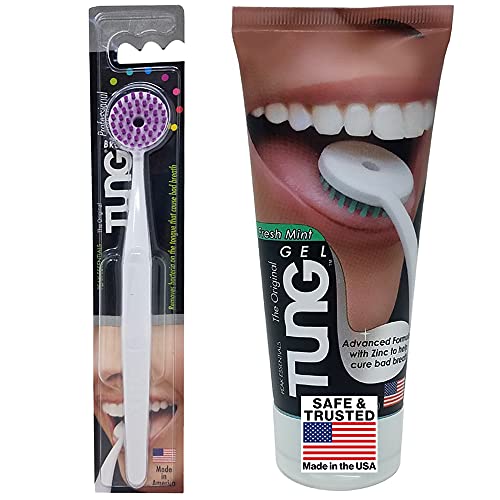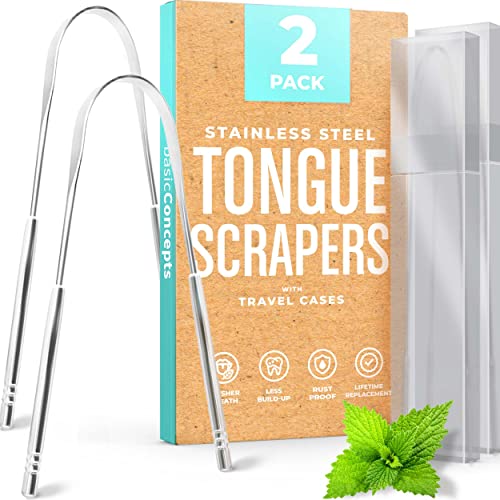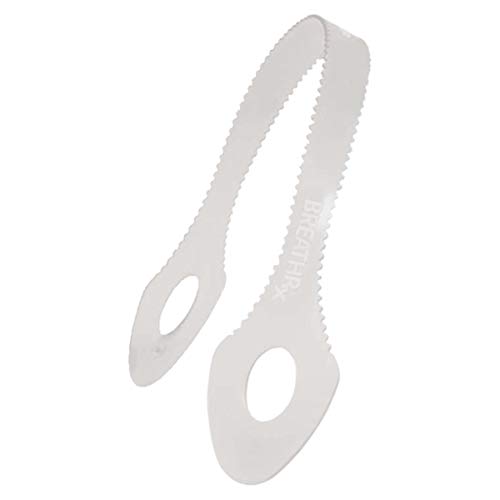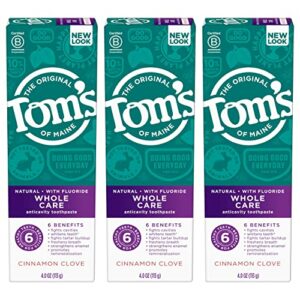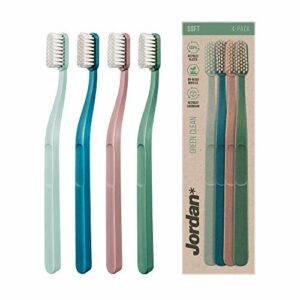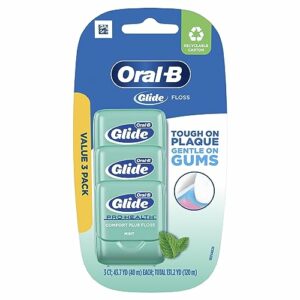We know how important it is to take care of our oral health. From brushing and flossing to regular dental check-ups, we make a conscious effort to maintain our pearly whites. But there’s one crucial aspect that often gets overlooked – tongue cleaning. Yes, that’s right, we’re talking about the science behind tongue cleaning. We understand that it may not be the most glamorous topic, but trust us, it’s worth exploring. In this blog post, we delve into the purpose of tongue cleaning and uncover the fascinating science behind why it should be a part of our daily oral hygiene routine. So let’s dive in and discover why our tongues deserve some extra love and attention.
Achieve Fresh Breath and Oral Health with Top-Selling Tongue Cleaning Products
What is tongue cleaning?
Introduction:Tongue cleaning is an essential part of maintaining good oral hygiene. It involves the removal of bacteria, food debris, and dead cells from the surface of the tongue. This simple practice has been used for centuries in various cultures and is now gaining popularity worldwide.
Why is Tongue Cleaning Important?
Eliminating Bad Breath:One of the most common reasons people opt for tongue cleaning is to combat bad breath or halitosis. The tongue’s rough surface provides an ideal environment for bacteria to thrive, leading to foul-smelling breath. Regular tongue cleaning can significantly reduce the bacteria responsible for this unpleasant odor.
Improving Oral Health:Tongue cleaning not only freshens breath but also promotes overall oral health. By removing bacteria and debris from the tongue, you can reduce the risk of oral diseases such as tooth decay and gum inflammation. Maintaining a clean tongue also enhances the effectiveness of other oral hygiene practices, such as brushing and flossing.
Enhancing Taste Sensations:A clean tongue can enhance taste sensations. When the taste buds on your tongue are free from a buildup of debris, they can better perceive the flavors of food and drinks. This not only improves your eating experience but also encourages mindful eating habits.
Methods and Tools for Tongue Cleaning
Tongue Scrapers:
- Tongue scrapers are simple, handheld tools designed specifically for tongue cleaning.
- They typically have a curved, flat edge that you gently drag across the surface of your tongue to remove bacteria and debris.
- Some tongue scrapers have textured surfaces, which provide additional stimulation and promote saliva production.
- Look for stainless steel or copper tongue scrapers as they are easy to clean and more durable compared to plastic ones.
Toothbrushes:
- Many toothbrushes now come with a tongue cleaner on the back of the brush head.
- These bristles can be used to gently brush the surface of the tongue and remove bacteria and debris.
- While not as effective as dedicated tongue scrapers, they can be a convenient option for those who prefer an all-in-one tool.
Tongue Brushes:
- Tongue brushes are small brushes specifically designed to clean the tongue.
- They have soft bristles that can effectively sweep away bacteria and debris from the tongue’s surface.
- Tongue brushes are a good alternative for those who find tongue scrapers uncomfortable or have a sensitive gag reflex.
Natural Remedies:
- Some people prefer using natural remedies for tongue cleaning.
- Oil pulling, a practice involving swishing oil (such as coconut or sesame oil) in the mouth, is believed to have oral health benefits, including tongue cleansing.
- Saltwater rinses and herbal mouthwashes can also help reduce bacteria on the tongue.
Benefits of Tongue Cleaning
Tongue cleaning is an often overlooked but essential part of oral hygiene. While most people diligently brush their teeth, they often neglect the health of their tongues. In this blog section, we will explore the numerous benefits of tongue cleaning, from removing bacteria to reducing bad breath and improving taste perception.
Removing Bacteria
The tongue is a breeding ground for bacteria. Its rough surface provides the perfect environment for microorganisms to thrive and multiply. These bacteria can lead to various oral health issues, including tooth decay, gum disease, and even systemic infections. By incorporating tongue cleaning into your oral care routine, you can effectively remove these harmful bacteria and reduce the risk of developing dental problems.
Reduction of Bad Breath
Bad breath, medically known as halitosis, is a common oral health concern that affects millions of people worldwide. While factors such as poor dental hygiene, certain foods, and medical conditions can contribute to bad breath, bacteria on the tongue’s surface are often the primary culprit. Tongue cleaning helps eliminate the bacteria responsible for producing foul-smelling compounds, leading to fresher breath and improved overall oral hygiene.
Improved Taste Perception
Have you ever noticed that your taste buds don’t seem as sensitive as they used to be? The accumulation of bacteria and debris on the tongue’s surface can actually dull your sense of taste over time. By regularly cleaning your tongue, you remove the layer of buildup that may be masking your taste buds, allowing you to fully enjoy the flavors of your food and enhancing your eating experience.
How to Clean Your Tongue
Now that we understand the benefits of tongue cleaning, let’s explore how to incorporate it into our daily routine. Follow these simple steps:
- Choose a tongue cleaner: Tongue scrapers and tongue brushes are two common options available. Select one that feels comfortable and easy to use.
- Position the tongue cleaner: Extend your tongue and gently place the cleaner at the back of your tongue. Ensure it covers as much surface area as possible without causing discomfort.
- Apply gentle pressure: Using light pressure, gently scrape or brush the cleaner along the surface of your tongue, moving from the back towards the front. Be careful not to press too hard to avoid causing any damage or discomfort.
- Rinse and repeat: After each scrape or brush, rinse your tongue cleaner to remove any accumulated debris. Repeat the process until you have covered the entire tongue surface.
- Cleanse your mouth: Finish by rinsing your mouth thoroughly with water or an antiseptic mouthwash to remove any remaining debris or bacteria.
The science behind tongue cleaning
Tongue cleaning has been practiced for centuries as an integral part of oral hygiene. However, have you ever wondered about the scientific basis behind this age-old practice? In this blog section, we will delve into the science behind tongue cleaning, exploring how bacteria accumulate on the tongue, the role of the tongue in oral health, and the research supporting its effectiveness.
Bacteria Accumulation on the Tongue
The tongue provides an ideal breeding ground for bacteria due to its rough surface and the presence of tiny taste buds. Throughout the day, bacteria, food debris, dead cells, and other particles accumulate on the tongue’s surface, forming a biofilm known as “tongue coating.” This coating not only contributes to bad breath but also serves as a reservoir for harmful bacteria.
The Role of the Tongue in Oral Health
The tongue plays a crucial role in maintaining oral health beyond its primary function of taste perception. It acts as a natural cleaner, constantly sweeping away food particles and debris from the teeth and gums. However, if the tongue is not properly cleaned, it can become a source of oral health issues.
Benefits of Tongue Cleaning
Regular tongue cleaning offers numerous benefits for your oral health. Here are some key points to consider:
- Improved breath: Tongue cleaning removes the bacteria responsible for bad breath, providing you with fresher breath throughout the day.
- Reduced bacteria: Cleaning the tongue effectively reduces the number of bacteria present, reducing the risk of dental problems such as cavities and gum disease.
- Enhanced taste: Removing the coating on the tongue can improve taste perception, allowing you to fully enjoy your food.
- Overall oral hygiene: Tongue cleaning complements brushing and flossing, ensuring a comprehensive oral care routine.
Research Supporting Tongue Cleaning
Scientific studies have shown the efficacy of tongue cleaning in maintaining oral health. Here are some research findings:
- A study published in the Journal of Periodontology found that regular tongue cleaning significantly reduced halitosis (bad breath) and improved oral hygiene.
- Another study in the Journal of Clinical Periodontology demonstrated that tongue cleaning combined with tooth brushing resulted in a greater reduction in bacterial counts compared to tooth brushing alone.
- Research published in the Journal of Clinical Dentistry concluded that tongue cleaning was effective in reducing volatile sulfur compounds (VSCs), which are major contributors to bad breath.
How to Clean Your Tongue
Now that we understand the science behind tongue cleaning, it’s important to know how to do it effectively. Here’s a simple step-by-step guide:
- Stand in front of a mirror and stick out your tongue.
- Hold a tongue cleaner or scraper firmly, starting from the back of your tongue.
- Gently scrape the surface of your tongue using light pressure, moving the scraper forward.
- Rinse the tongue cleaner under running water after each scrape to remove the accumulated debris.
- Repeat the scraping process until your entire tongue has been cleaned.
- Finally, rinse your mouth thoroughly with water.
Methods and techniques for tongue cleaning
Maintaining good oral hygiene is essential for overall health, and tongue cleaning is a crucial part of this routine. In this blog post, we will explore different methods and techniques for effective tongue cleaning. By the end, you’ll have a better understanding of the various tools available and how they can improve your oral health.
Tongue Scrapers
One of the most common tools for tongue cleaning is a tongue scraper. These are typically made of plastic or metal and have a flat, slightly curved shape. Here are some key points about tongue scrapers:
- Efficiency: Tongue scrapers are highly effective at removing bacteria, food particles, and debris from the surface of the tongue.
- Comfort: They are gentle on the tongue and do not cause any discomfort when used correctly.
- Easy to Use: Tongue scrapers are user-friendly and require minimal effort. Simply glide the scraper from the back to the front of your tongue, repeating as necessary.
- Maintenance: They are easy to clean and sanitize after each use.
Tongue Brushes
Another popular method of tongue cleaning is using a tongue brush. These brushes are specifically designed with soft bristles to clean the tongue effectively. Here’s what you need to know about tongue brushes:
- Thorough Cleaning: Tongue brushes offer a comprehensive cleaning experience, as their bristles can reach the small crevices on the tongue’s surface.
- Gentle on the Tongue: The soft bristles ensure that the cleaning process is gentle and does not cause any discomfort.
- Versatility: Some tongue brushes come with built-in scraper edges, providing a dual-functionality for both brushing and scraping.
- Hygiene: Tongue brushes are easy to clean and maintain, ensuring proper hygiene.
Other Tools for Tongue Cleaning
Apart from tongue scrapers and brushes, there are other tools available that can aid in effective tongue cleaning. Here are a few notable options:
- Tongue Cleaning Pads: These pads are often infused with antibacterial agents and can be used to wipe away bacteria and debris from the tongue’s surface.
- Tongue Cleaning Sprays: These sprays contain antibacterial ingredients that help in reducing bacteria on the tongue. They are easy to use and can be sprayed directly onto the tongue for quick cleaning.
- Electric Tongue Cleaners: These battery-operated devices provide automated cleaning of the tongue’s surface. They often come with replaceable brush heads or scrapers for convenience.
Choosing the Right Method for You
When it comes to tongue cleaning, the right method varies from person to person. Factors such as personal preference, comfort, and individual oral health needs play a role in selecting the most suitable tool. Consider the following points when choosing your preferred method:
- Effectiveness: Look for a method that effectively removes bacteria and debris from your tongue.
- Comfort: Ensure that the chosen tool feels comfortable in your mouth and does not cause any discomfort.
- Ease of Use: Consider the ease of use and whether the tool fits into your daily oral hygiene routine.
- Maintenance: Check if the tool is easy to clean and sanitize to maintain proper hygiene.
Understanding the benefits and importance of maintaining a clean and healthy tongue
In conclusion, we have explored the science behind tongue cleaning and its benefits for our oral health. Throughout the post, we learned that the tongue harbors a multitude of bacteria and debris that can contribute to bad breath and other oral issues. By regularly cleaning our tongues, we can effectively remove these harmful bacteria and improve our overall oral hygiene.
It is important to consider the various factors when deciding whether to incorporate tongue cleaning into our daily routine. Factors such as personal preference, oral health concerns, and the type of tongue cleaner to use should be taken into account. While there are different methods available, such as tongue scrapers and brushes, the important thing is to find a method that works best for us.
Based on the information presented, we recommend giving tongue cleaning a try. It is a simple and effective practice that can significantly improve our oral health and overall well-being. By incorporating tongue cleaning into our daily routine, we can enjoy the benefits of fresher breath, reduced bacterial buildup, and a healthier mouth.
Remember, each person’s oral health needs may vary, so it is always advisable to consult with a dental professional for personalized advice. Let’s take care of our tongues and make tongue cleaning a part of our regular oral hygiene routine for a healthier smile.


